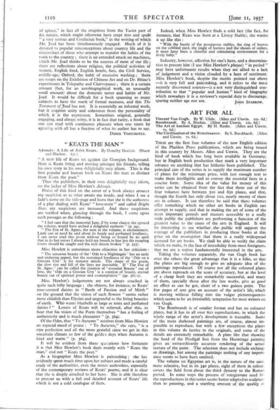" KEATS THE MAN"
" A NEW life of Keats set against the Georgian background.
Here is Keats living and moving amongst his friends, telling his own story in his own delightfully racy idiom. This is the first popular and human book on Keats the man as distinct from Keats the poet."
Thus the publishers, in their own delightfully racy idiom, on the jacket of Miss Hewlett's Adonais.
Praise of this kind on the cover of a book always arouses my suspicion as to what awaits me inside, and when I see a lady's name on the title-page and learn that she is the authoress of a play dealing with Keats' " love-story " and called Bright Star, my suspicions are increased. And these suspicions are verified when, glancing through the book, I come upon such passages as the following :
"I feel sure that the immortal Jane, if by some chance she opened the volume, would have arched a delightful eyebrow" (p. 94).
"The Eve of St. Agnes, the next in the volume, is enchantment. Little can or need be said about its heady and perfumed loveliness. I can never read this poem without being so bound by its spell that in its last verses I always hold my breath in fear lest the escaping lovers should be caught and the rich dream broken" (p. 355).
Miss Hewlett is sometimes more objective in her criticism :
"The sensuous beauty of the Ode to a Nightingale' has an early and enduring appeal, but the restrained loveliness of the 'Ode on a Grecian Urn' is for maturer minds. The shape of the poem, the slow rise and fall of the lines are inevitable. If The Eve of St. Agnes' can be called the creation of essential Beauty' out of love, the Ode on a Grecian Urn' is a creation of beauty, eternal beauty out of spiritual power and contemplation" (pp. 361-2).
Miss Hewlett's judgements are not always couched in quite such lofty language ; she objects, for instance, to Keats' rose-scented daisies in "Bards of Passion and of Mirth" on the ground that the vision of such flowers "seems rather more childish than Elysian and ungrateful to the living beauties of earth. WhO wants bluebells as large as tents and perfumed daisies ? " Lovers of Keats will be relieved, after this, to hear that his vision of the Poets themselves "has a feeling of authenticity and is much pleasanter" (p. 364).
Of the Odes, that "To Autumn" receives from Miss Hewlett an especial meed of praise : "To Autunm,". she says, "is a ripe perfection and all the more grateful since we get in this uncertain climate so few of the golden days when Autumn is kind and warm " (p. 364).
It will be evident from these quotations how fortunate it is that Miss Hewlett's book deals mainly with "Keats the man," and not "Keats the poet."
As a biographer Miss Hewlett is painstaking ; she has evidently spent much time upon her subject and made a careful study of the authorities, even the minor authorities, especially of the contemporary reviews of Keats' poems, and it is clear that she is deeply attached to her hero. She is able therefore to present us with a full and detailed account of Keats' life which is not a cold catalogue of- facts. Indeed, when Miss Hewlett finds a cold fact (the fact, for instance, that Keats was born at a Livery Stable), she warms it up like this :
"With the bustle of the prosperous stables, the ring of hooves on the cobbled yard, the jingle of harness had the shouts of ostlers, it must have been a cheerful and stimulating environment for a lively baby."
Industry, however, affection for one's hero, and a determina- tion to present him (I use Miss Hewlett's phrase) "in period"
may have unfortunate- results when they are allied to a lack of judgement and a vision cloudedr by a haze of sentiment. Miss Hewlett's book, despite the merits pointed out above
—it is very full and painstaking, and it _refers to the mon recently discovered sources—is a not very clistinguishe. d con- tribution to that "popular and human" kind of biography which nowadays it is a reviewer's especial duty to discourage,
-
























































 Previous page
Previous page